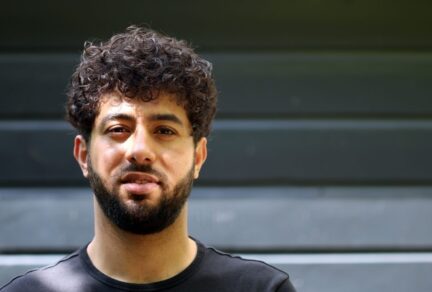
It's OK... Cirkel 1: Tanaqush: The Chiselling of Collectivity #2
9 June 2023
5:00 p.m. – 7:00 p.m.
Panel discussion on collectivity and listening.
This first circle was brought together by artist and researcher Isshaq Albarbary. Central to the meetings of this circle is the question: how can we make time and space for conversation and listen to each other with attention? Together with Salim Bayri, Alina Jabbari, Ehsan Fardjadniya, Ola Hassanain, Hilda Moucharrafieh, Selma el Boundati, Winston Nanlohy, Albarbary explores how time can be made collective to arrive at new concepts. During the conversation, notions of knowledge and marginalisation, newcomer and resident, centre and periphery, theory and practice are challenged. Through lively tanaqush (تَناقش, Arabic for "discussion"), we can form a vibrant environment of mujaawarah (مُجاورة, Arabic for "neighbourhood") that flourishes in non-hegemonic political and social contexts.

About Isshaq Albarbary
Isshaq Albarbary's practice delves into the notions of "refugee cultural heritage" and the use of "culture as a weapon system." He has a Master of Fine Art and Design from HKU, Utrecht, and is a member-owner of Urban Front. In 2017/2018, he was a fellow at BAK (basis voor actuele kunst), and previously was a member and coordinator of Campus in Camps, an artistic educational initiative that fostered collaborative critical learning environments in Palestinian refugee camps. He is also a founding member of Al-Maeishah collective, and a member of (A)WAKE collective in Rotterdam. Collaboratively, Isshaq has exhibited his work at venues such as the Van Abbemuseum in Eindhoven, the Serralves Museum in Porto, and the Renaissance Society in Chicago. His contributions have also been featured in significant international events including the São Paulo Biennial, Qalandya International in Palestine, documenta 14 in Kassel, and the Chicago Architecture Biennial. Born in 1988 in Beit Jibrin refugee camp, Palestine, Isshaq Albarbary currently resides and works between Amsterdam and Bethlehem.
About the participants
Winston Nanlohy (born 1986, Breda, The Netherlands) is a visual artist. He holds a BA in Audiovisual Art from the Gerrit Rietveld Academy, Amsterdam, the Netherlands (2013) and an MA in Fine Art and Design from HKU University of the Arts Utrecht, the Netherlands (2020). In his practice, Nanlohy explores possible ways to inhabit “public” spaces - both physical and digital - as a way to form and sustain meaningful relationships. Surveillance technologies are today’s dominant tools: they inform and direct the ways in which “our” habitats are designed (by corporations and governments). By exposing the power structures hidden in plain sight that thrive on extraction and oppression, Nanlohy seeks to design interventions, such as guided walks and performative presentations, to inhabit these sites and domains differently.
Selma el Boundati is a cultural practitioner. She has an MS in cultural anthropology from the University of Utrecht, where she wrote a thesis on climate justice.
Hilda Moucharrafieh (1986, Lebanon) makes artistic interventions in public space with mediums that are site-specific and stemming from research. Her work tells stories of people that are excluded from the dominant narratives, and therefore not represented in the urban experience of streets, public squares and historical monuments. She often collaborates with friends and artists with aligned political and social values yet of varying experiences. Moucharrafieh holds a BA in Graphic Design from Lebanon, and an MFA in Scenography from the University of the Arts Utrecht (HKU), where she has been a tutor at the Master Scenography programme since 2017. In 2016-2017 she was a fellow at the Home Workspace 10-month program at Ashkal Alwan, Beirut, Lebanon. She is the artistic supervisor at (A)WAKE artist residency programme in Rotterdam, and the artistic coordinator and mentor at Over het IJ Festival in Amsterdam.
Ola Hassanain leads a critical spatial practice as a visual artist and trained architect. In her work, she focuses on the subtle politics of space—namely, how built spaces react to and reinforce violence from state entities. She situated the built environment as something that regulates the lives of those who inhabit it. Ola premises her work on an idea of “space as political discourse,” an expanded notion of space that tries to develop spatial vocabularies that make it possible to aspire to new kinds of ecologies. Ola's development of critical spatial practice is partly informed by her post-academic training; an ongoing Rijksakademie residency, a BAK fellowship 2017-2018, head tutor of Blackerblackness Master course Sandberg Instituut 2021- Ongoing and HKU University of the Arts Utrecht at the Fine Art Department 2017- ongoing, amongst other international collaborations.
Salim Bayri is extending his visa permit now, he will probably get a 3 to 5 years extension so he feels reassured. He used to make artworks about the anger towards immigration problems, but now, he is calm and doesn't feel the need to say something out loud. Come to his housewarming party soon to be announced on his Instagram salim_five_and_thursday.
Alina Jabbari is an interdisciplinary scholar, researcher and educator. She works as a lecturer in social sciences at the American University of Iraq-Sulaimani, a trainer and consultant for Restorative Justice Netherlands, and is currently a Alfred Landecker Democracy Fellow. She is passionate about creating decolonial inclusive communities and envisioning practical ways to manifest transformative justice.
About It's OK...
This circle is part of the multi-year collective art project It's OK... commoning uncertainties around sharing uncertainties and narrating different realities. It's OK... is curated at the initiative of Jeanne van Heeswijk by more than a hundred makers, thinkers, activists, artists, local residents.
